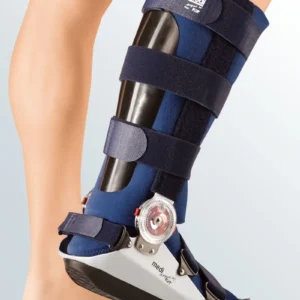Spinal fracture
Spinal fractures is an injury involving fragmentation of one or more vertebrae in the spine. It can vary in severity, from mild fractures to more serious injuries that can jeopardise the stability of the spine. They can occur in different parts of the spine, including the cervical (neck), thoracic (middle back) or lumbar (lower back) vertebrae. It is an injury that requires immediate medical assessment by a healthcare professional, such as an orthopaedic surgeon or neurosurgeon, as timely treatment can help prevent complications and promote a more effective recovery.
Most common pathologies
in the lumbar spine and trunk
Symptoms
Intense pain in the affected area of the spine; Difficulty or inability to perform normal movements of the spine; Tingling or numbness in the lower extremities or even muscle weakness, and there may even be an inability to walk or stand; In more severe cases, a visible deformity of the spine may be noticeable.
Risk Factors
Traumatic injuries, such as car accidents or falls; Osteoporosis or other diseases that affect bone density; Advanced age. can increase susceptibility to fractures with less impact.
Protective Factors
Prevention of accidents in the home and work environment; Timely diagnosis and treatment of medical conditions that affect bone density; Maintaining a routine of physical activity and exercises to strengthen the muscles supporting the spine.
Treatment
In some fractures, immobilisation with waistcoats, straps or collars may be necessary to allow the bone to heal/consolidateAnalgesics; Physiotherapy and rehabilitation are often essential to recover function and reduce pain; In more serious cases, especially when there is instability in the spine, surgery may be necessary to stabilise and fuse the vertebrae.
Information: All the information contained here is merely a summary for a general understanding of the pathologies, highlighting their definition, symptoms, risk factors, protective measures and treatment options.
Consulting a specialised health professional is essential for an accurate diagnosis and an effective treatment plan.
Support and protection for spinal fractures
Discover all the orthotics for spinal fractures
-
Seleccione Opções This product has multiple variants. The options may be chosen on the product page
-
Seleccione Opções This product has multiple variants. The options may be chosen on the product page
-
Seleccione Opções This product has multiple variants. The options may be chosen on the product page
-
Seleccione Opções This product has multiple variants. The options may be chosen on the product page
-
Seleccione Opções This product has multiple variants. The options may be chosen on the product page
-
Seleccione Opções This product has multiple variants. The options may be chosen on the product page
-
Seleccione Opções This product has multiple variants. The options may be chosen on the product page
-
Seleccione Opções This product has multiple variants. The options may be chosen on the product page
-
Seleccione Opções This product has multiple variants. The options may be chosen on the product page
-
Seleccione Opções This product has multiple variants. The options may be chosen on the product page
-
Seleccione Opções This product has multiple variants. The options may be chosen on the product page
-
Seleccione Opções This product has multiple variants. The options may be chosen on the product page















